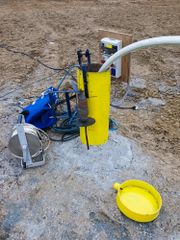How Can Water Wells Get Contaminated?

Well installations provide one of the most effective ways to ensure a steady supply of fresh and clean water to your home. However, it’s crucial that you know what might cause contamination and how to prevent it. This guide explains well impurities and what you can do to ensure your water remains safe.
4 Causes of Water Well Contamination
1. Runoff
During rainstorms, water will move downhill and pick up contaminants along the way. If your well sits on a low point of your property, runoff may introduce fertilizers, pesticides, and toxic waste into the water. In addition to testing your well water annually, test it after heavy storms to ensure it’s still healthy.
2. Improper Well Placement
 One of the most common reasons why wells become contaminated is when they are located on low ground. Lack of elevation makes wells more vulnerable to runoff and snowmelt, which exposes them to bacteria, chemicals, and toxins. As you prepare for your well installation appointment, select an elevated spot on your property.
One of the most common reasons why wells become contaminated is when they are located on low ground. Lack of elevation makes wells more vulnerable to runoff and snowmelt, which exposes them to bacteria, chemicals, and toxins. As you prepare for your well installation appointment, select an elevated spot on your property.
3. Poor Maintenance
Harmful microbes tend to multiply in your water well without proper upkeep. Test the water at least once a year to ensure healthy levels of bacteria don’t start to grow out of control. If your well uses an activated charcoal filter, replace it regularly to prevent microorganisms from overpopulating.
4. Damages
Damages to your well casing, such as cracks and holes, may expose your well’s interior to the soil around it. As a result, your water may become muddy and contaminated by impurities in the soil. Schedule annual well inspections so that your contractor can spot damages and repair them.
Keep your water well safe and healthy with maintenance from Johnson Water Well Drilling. They offer well installations, inspections, and pump repairs to clients throughout Foley, AL. Call (251) 955-5236 to get a quote on a well installation, and visit the website to learn more about how the well drilling process works.
About the Business
Have a question? Ask the experts!
Send your question

